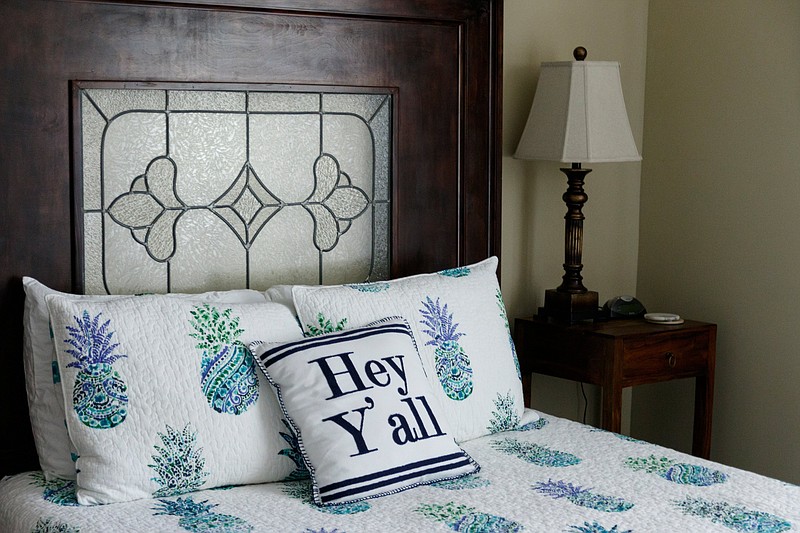Beth Palmer started building a house in Chattanooga shortly before the city temporarily stopped issuing new permits for certain short-term vacation rentals.
The home would have been Palmer's fourth such rental in Chattanooga, and although construction has since finished, Palmer said new rules going before the City Council on Tuesday would prevent her from getting a permit because the property is in a residential area.
"They've essentially decreased the value of our investment significantly with these rules," Palmer said in a phone call. "We can only do 30-day rentals or longer."
The Chattanooga City Council is preparing to take another crack at revising the city's regulations after pausing all new permits more than a year ago for vacation rentals not occupied by the owner of the property.
The guidelines they will be reviewing Tuesday would permit those types of rentals in all commercial zones that also allow the construction of a hotel. They would also be restricted from all residential areas except under rare circumstances that don't currently exist in any neighborhoods.
The changes would require two votes of approval before going into effect. Another effort in March to change the city's rules failed in front of the council.
Chris Anderson, a senior adviser in the mayor's office, said Chattanooga Mayor Tim Kelly has sought to protect the character of neighborhoods while also giving the industry room to grow.
"What we have presented in this compromise legislation takes those principles but also adds in several provisions we have heard from the council over the last several months," Anderson said in a phone call. "There's something in there that every council person will like. We've given them a piece of legislation that is a great place to start."
Under existing rules, vacation rentals are restricted to a part of the city known as the overlay, where they're allowed in zones that permit housing as long as they meet certain requirements.
The overlay predominantly includes the districts represented by Councilman Chip Henderson, of Lookout Valley; Councilwoman Jenny Hill, of North Chattanooga; Councilwoman Demetrus Coonrod, of Eastdale; Councilwoman Raquetta Dotley, of East Lake; and Councilwoman Marvene Noel, of Orchard Knob.
Under the proposal council will take up Tuesday, absentee rentals — those where the owner doesn't live onsite — would be allowed citywide but would be limited to the 11 zoning designations that allow hotels.
Homestays — those where the owner does live onsite — would be allowed in those same commercial areas but would also be permitted in all residential zones within the existing overlay.
(READ MORE: Property owners form group to oppose Chattanooga's proposed vacation rental rules)
Additionally, no more than a quarter of a multi-unit residential structure could be turned into vacation rentals, and no owner can apply for a permit within 18 months of rezoning property to one that allows vacation rentals.
The city would require applicants to pay $250 per year to operate a homestay rental and $500 per year for an absentee rental, an increase over the current fee of $150. Those fees will help pay for new enforcement measures to clamp down on the hundreds of rentals operating illegally in Chattanooga. The city will grandfather in all existing permits.
"Nobody who is currently operating within the law will be put out of business," Anderson told the council on May 2. "They can continue to operate. They just need to continue doing their paperwork every year."
Hill said those proposed guidelines represent a good compromise.
"We went down a path to try to preserve the ability to have some absentee short-term vacation rentals in residential areas, but that did not get the full support of the council," she said in a phone call. "This is a good way to provide clarity and consistency for all stakeholders — both Chattanooga residents and also people who invest in short-term vacation rentals."
Hill said restricting the location of absentee rentals and placing a density cap on units also helps preserve housing that could otherwise turn into short-term vacation rentals.
"Availability of housing is critical right now," Hill said. "Every home that isn't available for long-term living is a home that is taken out of the housing ecosystem."
According to estimates from AirDNA, there were 936 short-term vacation rentals in the city of Chattanooga as of June 2022, encompassing 1.2% of all residential properties.
Palmer, who owns several rental units, said property owners are frustrated with how severely the proposed rules would restrict the location of absentee rentals, placing them in zones that allow hotels.
"That is certainly a very extreme stance that not very many cities in the country have tried to take," she said. "I do believe that they are infringing on some constitutional rights for property owners.
"Hotels are large corporations," she added. "Short-term rental owners are small business owners. It seems in my view that they're giving preference to all of the new hotel developments that are coming into Chattanooga, and I see a new one every week."
The proposed rules are extremely limiting for people looking to make extra income.
"It's not leveling the playing field," Palmer said. "It's completely taking somebody out of the ballgame."
Contact David Floyd at dfloyd@timesfreepress.com or 423-757-6249.
